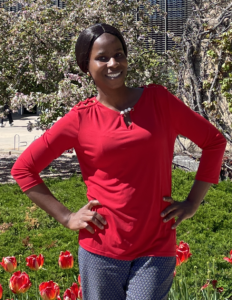Since 2016, the Writing Center has recognized the outstanding contributions of our teaching assistance through teaching excellence awards. Our team of over 30 highly skilled teaching assistants, who are enrolled in either master’s or doctoral degree programs, provide one-to-one writing instruction to students. In addition to this, they actively participate in campus-wide outreach initiatives, lead workshops, and undertake various other responsibilities.
Teaching assistants are encouraged to apply for these awards by submitting a statement outlining their philosophy of writing center instruction and reflecting on their experiences. Furthermore, they are asked to furnish evidence of their excellence in teaching and to reflect on this evidence.
The selection committee evaluates these applications for dedication to students; commitment to diversity, equity, inclusion, and/or accessibility; growth and effectiveness in tutoring; ability to work with writers in various disciplines and at different levels; innovation in tutoring; and reflective practice.
We are pleased to announce the winners of our 2024 teaching excellence awards. Haley A. Johnson is the recipient of the TA Award for Early Excellence, recognizing her achievements within her initial two years of teaching at the Writing Center. Emery Jenson and Arawomo Oluwayinka are the recipients of the TA Award for Advanced Excellence. TAs who have taught at the Writing Center for more than two years are eligible for this award. While we typically only recognize one TA for advanced excellence, the exceptional caliber of our candidates this year compelled us to honor two deserving individuals.
As part of our celebration of their exceptional contributions to the Writing Center, we are delighted to share their statements of writing center philosophy.
Haley A. Johnson—Recipient of the TA Award for Early Excellence
Statement of Writing Center Teaching Philosophy

I have always held a commitment to diversity, equity, and inclusion, and my favorite part about the Writing Center continues to be how diverse students and staff are. To practice DEI in the workplace, I make sure to celebrate student efforts in each appointment; afterall, no matter what stage they are in their learning, attending a top public university is an achievement. Specifically, I value student writing and ideas. Too often in instruction I find that instructors can set a certain standard or style of writing as the goal, or forget to include student perspective in search of the ‘right’ answer. I have found students develop more confidence when they can trust that their work is clear and appreciated by a reader.
To highlight student writing, I notice when a different convention is being used and praise it. By acknowledging difference and complimenting it, rather than ignoring or correcting writing, students have expressed feeling appreciated and heard, including one student reviewer who in my evaluations commented that I “appreciated [their] background, listened to [their] story, made [them] feel safe.” A review like this is very meaningful to me because all too often I have had students come to an appointment crushed after receiving highly critical feedback. Being specific about why difference is interesting and important in my comments to students, and choosing not to omit certain phrases or sentence structures in favor of my own is how I show commitment to this value.
To support student ideas, I find that I use praise, specific compliments, and questions. Having an idea is a very brave thing for a student to do, and representing that in writing is a very specific skill, and it is important to let students know that we find their work interesting and worthwhile. In fact, a student wrote, “Haley kindly went with me through every idea I had and helped me create an outline. She also gave me a fresh perspective on the way the statement can present me and my ideas” in my Writing Center evaluations. In this example, I used an outline, as I find they are important for both the instructor and the student as a kind of guide post, but also as a way of affirming the student that they are being listened to, and that the priority of their arguments, and intent of their structure is valuable to me as a teacher. During this process, I repeatedly pause to confirm whether the student likes the direction we’re going in, if they agree with any changes made, or want to return or move on from something. I also let them know that I am actually not the one in charge of the assignment, they are, and anything I’ve suggested or altered they are welcome to comment or remove. By establishing student autonomy in support of their ideas, and praising their writing style and thinking, I have created a teaching philosophy that I hope to continue expanding and honing in future years.
Emery Jenson—Recipient of the TA Award for Advanced Excellence
Statement of Writing Center Teaching Philosophy

How do academic and writerly conventions reproduce exclusionary hierarchies of power in Writing Centers? How can formal and structural approaches to writing nevertheless empower students as writers? My teaching philosophy in the Writing Center develops in response to these questions which sit in uneasy relation to the other. For my pedagogy, these questions raise the problem of how I might respond to the normative overdetermination of “good writing” while also mobilizing writing as a tool for learning, self-expression, and world making.
When a student comes into the Writing Center, I work with a more discrete set of questions: where are we writing from? What are we writing towards? As Eugenia Zuroski notes, reflecting on the pedagogy of Kathrine McKittrick, the question “where do you know from” subverts what is essentializing in the more common, “where are you from?” Similarly, asking ourselves where we write from is a way of avoiding an overdetermination of our writing while simultaneously drawing on the lessons of standpoint epistemology and intersectionality to articulate the forces and expectations which shape different practices of writing and evaluation. Second, by asking what we are writing towards, the pedagogical situation emerges from the crucial but potentially stultifying moment of critique. We see each other, we take writing as a contingent, historically determined object, and we go somewhere. Our destination shapes things like style, syntax, and convention. By marking out a goal, we make “good writing” a tool rather than a law. Good writing is what gets us where we’re going.
As an instructor, I match my commentary on a student’s writing to the explicit conversations we’ve had about where they’re coming from and where they’re going. If your journalism professor complains about the gerund, you’ll also want to avoid verb + adverb constructions: this will help with your goal of approximating a “sizzling” journalistic style. Matching goals to advice helps students to recognize where their writing diverges from their voice, the ways in which their writing can be shaped according to its formal qualities, and how their writing can become, again, an effective vehicle for what they want to say. As someone who also studied STEM in undergrad, I found a graphical representation of paragraph structure to be most intuitive. When students encounter writing in familiar forms, it becomes less opaque, more accessible, and therefore more malleable. Attending to these aspects of my students and their writing allows me to balance the questions which open this statement, questions which otherwise seem to hover far above the everyday work of the Writing Center. My teaching philosophy is theoretically informed yet its goal is ultimately practical: to send my students out of 6171 HCW well on their way to whatever they’re writing towards.
Arawomo Oluwayinka—Recipient of the TA Award for Advanced Excellence
Statement of Writing Center Teaching Philosophy

Through my experience working with diverse students on various writing projects, I have realized that advancing students’ writing in a one-to-one context depends on meaningful collaboration and dialogue. For instance, after the initial greetings, questions like “What are you working on today?” and “What do you want me to prioritize?” set the tone for productive dialogue and collaboration, essential for achieving students’ identified goals for the session. Collaboration looks different based on students’ needs. Together, my student and I agree on what to do and how to proceed, assuming different roles. For example, while my student works on an identified part of their essay through freewriting, I continue to read a different portion and identify points to discuss. At times, we look at the piece together and discuss opportunities for revision. By prioritizing dialogue, I empower my students to take agency in refining their writing skills within an atmosphere of support and shared laughter. A focus on collaboration and dialogue encourages my students to invest in refining their paper, while I serve as a coach and a curious reader.
As a writing center tutor, I approach my instruction differently, teaching my students transferable strategies for analyzing their drafts for revision beyond providing mere feedback. I have been experimenting with two central strategies: reverse outline and taking sentences apart. These methods allow students to see how their ideas are coming together, understand the flow in the paper better, and feel empowered to continue working on their paper beyond the session. Communication with them is very salient throughout the session because initially taking apart their work may seem nerve-racking. This builds confidence as they trust the process. Students consistently praise this approach as holistic rather than just quick fixes. My objective is to help students understand writing as putting ideas clearly and concisely together, like solving a jigsaw puzzle. My job is to work with them to decide together on the pieces to move to have the ideas fit nicely in answering the prompts correctly. Sometimes, we realize they need to analyze the prompt better to include more relevant pieces in their essay.
Reflection is also an important part of my writing center work. For instance, I created a Google document to record session reports for easy and timely submission to WCOnline. However, it serves a more important purpose for me to reflect, as I match the goals my students talked about with what actually happened in the session. While deviations from the goals may occur, it is satisfying when the results show that I delivered more for the students while keeping their goals in mind.
I am committed to genuinely supporting students, even if that means going the extra mile for them. For instance, my willingness to review their revised drafts even beyond the scheduled appointment to ensure my students are well supported, while I am also mindful of boundaries and prioritizing my well-being.
The leadership team at the UW–Madison Writing Center is proud to honor these instructors’ excellent work in our center.

